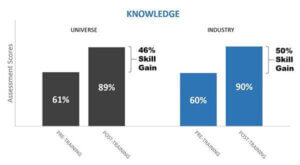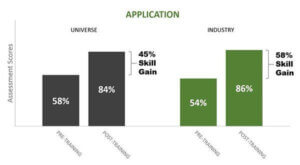Can you prove that a sales training program actually delivers on its promise of improvements in skills and knowledge?
I can.
As I have explained in previous editions of eCoach, my company, The Sales Board, has been using a validated instrument to reliably measure factors pertaining to Action Selling ® training since 1995. Those factors include how much knowledge a salesperson has about each of the five Critical Selling Skills that Action Selling ® teaches; how much that knowledge level improves after training; and how well the person is able to use the knowledge on the job.
That last point—measuring the application of skills and knowledge on the job—has always been the missing link in proving a direct connection between sales training and a subsequent increase in sales revenue.
Today, 21 years later, we have compiled data on 400,000 salespeople from more than 3,500 companies in a broad range of industries. Our SQL relational database contains about 78 million data points. We have so much “big data” on the impact of sales training that we can report results not only for the whole “universe” of salespeople, but for salespeople within particular industries.
Let’s look at the professional-services industry, for instance. “Professional services” includes fields such as architecture, accounting, engineering, medicine, law, IT services, management consulting, and others. How do salespeople in the professional services industry compare to the broader universe in terms of the tangible benefits they gain from sales training?
How do salespeople in professional services compare to those in other industries?
For the most part, professional services tracks the universe pretty closely. A significant difference appears, however, in the degree to which professional-services salespeople improve their ability to apply skills after training. Looking at post-training application scores for all five of the critical sales skills combined, the universe shows an 86 percent gain; professional services shows an 89% gain.
The difference is most pronounced when we isolate Critical Sales Skill #3, Questioning/Listening. The best salespeople don’t just ask questions; they ask the best questions. These are the questions that allow them to develop a better understanding of the client’s situation and demonstrate their sincere interest in the client. Salespeople who do this best succeed most often at “selling themselves”—which is one reason why questioning is such a critical skill.
Here is training data for salespeople in professional services, vs. the universe in general, when we isolate the skill of Questioning/Listening.
IMPROVEMENT IN CRITICAL SALES SKILL #3: QUESTIONING/LISTENING


A few observations about the numbers in those charts:
- In Questioning/Listening, professional services exceeded the universe to a meaningful degree in Knowledge gain (50% vs 46%) and by a huge margin in Application gain (58% vs 45%).
- This suggests that salespeople in the professional services industry are significantly better than average at putting knowledge to work in the form of real-world performance improvement. They are especially good at turning knowledge about questioning skills into actual great questions when talking to clients.
- By boosting this skill alone to such a degree, the training program more than justifies its cost. And remember that the overall application gain for all five critical skills combined was a whopping 89 percent.
For information about how to make sales training pay huge dividends, contact Action Selling ® at (800) 232-3485.
For a deeper look at the insights that 20 years’ worth of validated data can provide about the impact of training on companies like yours, see our Big-Data-Driven Sales Training Report for Your Industry.

